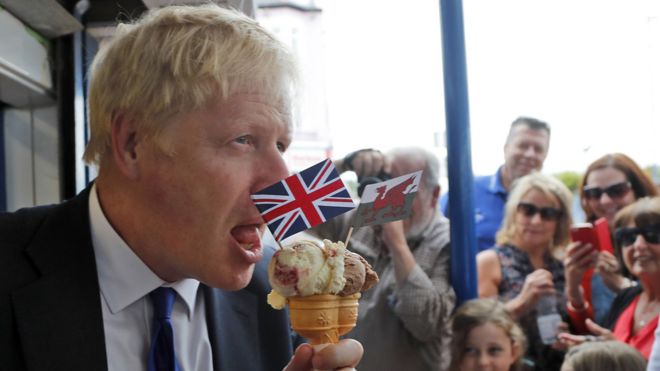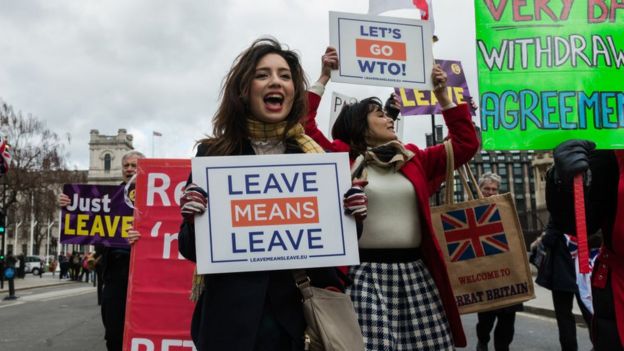The question of how the UK will leave the European Union (EU) is very much alive, as Conservative Party members choose a new prime minister. Do MPs have the power to stop a no-deal Brexit if the new prime minister wants one?
 GETTY IMAGES
GETTY IMAGESBoris Johnson says the UK will leave the EU on 31 October "deal or no deal"
What is no deal?
Tory leadership contender Boris Johnson says he is not bluffing about leaving the EU on 31 October - even if it means walking away without a deal.
His opponent, Jeremy Hunt, says he will decide by the end of September whether there is a "realistic chance" of reaching a new deal. After that, he will prepare to leave without one.
A no-deal Brexit means the UK would immediately leave the EU with no agreement in place about the "divorce" process - or how they separate.
 GETTY IMAGES
GETTY IMAGES
Overnight, the UK would leave the single market and customs union - arrangements designed to help trade between EU members.
Many politicians and businesses say this would damage the economy.
Others say the risks are exaggerated.
Theresa May couldn't persuade her own MPs to support her agreement with the EU, which would have avoided no deal. That's why she resigned.
Unless the new prime minister can get their own Brexit plan passed, the UK will face the prospect of leaving with no deal on Halloween.
The alternative would be extend the deadline again - or cancel Brexit altogether.
- No-deal Brexit: What you need to know
- Do the people choosing the next PM think like you?
- The people who will choose the UK's next prime minister
- Laura Kuenssberg: What do Tory party members want?
How could a new prime minister make no deal happen?
In theory, unless a new plan is agreed, the new prime minister does not need to do anything for a no-deal Brexit to happen.
This is because the UK's departure on 31 October is already written into law. The prime minister could just run the clock down.
But it is not as simple as this.
Most MPs in the UK Parliament are against leaving without a deal. And they could try to stop it from happening.
The prime minister could try to get round this problem by closing Parliament in the run-up to Brexit day. This would deny MPs an opportunity to block no deal.
It's called prorogation and would be a highly controversial move.
- What the EU elections tell us about support for Brexit
- The leadership candidates trying to stop Brexit
What can MPs do to stop no deal?
If there is no attempt to close Parliament, MPs have a few options.
Hijack new laws to avoid no deal
If the government tries to pass new laws, MPs could try to make changes that would force the government's hand.
For example, they could add new clauses that would push back the Brexit deadline.
 GETTY IMAGES
GETTY IMAGES
The main obstacle is whether the government has to introduce any new laws at all.
A new prime minister might want to pass legislation to help prepare the UK for a no deal, for example in trade. But it is up to them whether or not to do so.
Hold a vote of no confidence to get rid of the government
Seen by some as the "nuclear option", MPs have the option to vote out the government.
If most MPs oppose the government in a vote of no confidence, the prime minister is out.
Under rules introduced in 2011, such a vote either gives a different group of MPs a go at forming a government or leads to a general election.
Labour says it will call for a vote of no confidence once the new prime minister is in place.
Jeremy Corbyn, its leader, did this in January - but Theresa May comfortably saved her job.
The big question is whether, if the UK is heading for no deal, enough Conservative MPs would vote to dismiss their own leader.
Express the will of Parliament
MPs sometimes vote on things to show their opinion, even if that doesn't lead to new laws.
They could do this to express their opposition to a no-deal Brexit.
It wouldn't force the prime minister to do anything but it could put him under pressure.
John Bercow, the speaker of the House of Commons, has hinted he could help MPs find ways to force the government's hand, such as emergency debates.
This might rely on some creative interpretation of the rules.
Keep Parliament open
Of course, all of the above depends on Parliament being kept open.
Boris Johnson has so far refused to rule out giving MPs a forced break - so they can't force his hand.
Some opponents are looking for ways to block him from doing so.
Conservative MP Dominic Grieve tried to use government legislation to block any closure of parliament in the run up to Brexit.
However, he failed to pass amendments which would have legally bound the future PM to keep parliament open in October.
The government's tiny majority in the Commons means these issues are often decided on a majority of one or two votes.
https://www.bbc.com/news/uk-politics-48519746